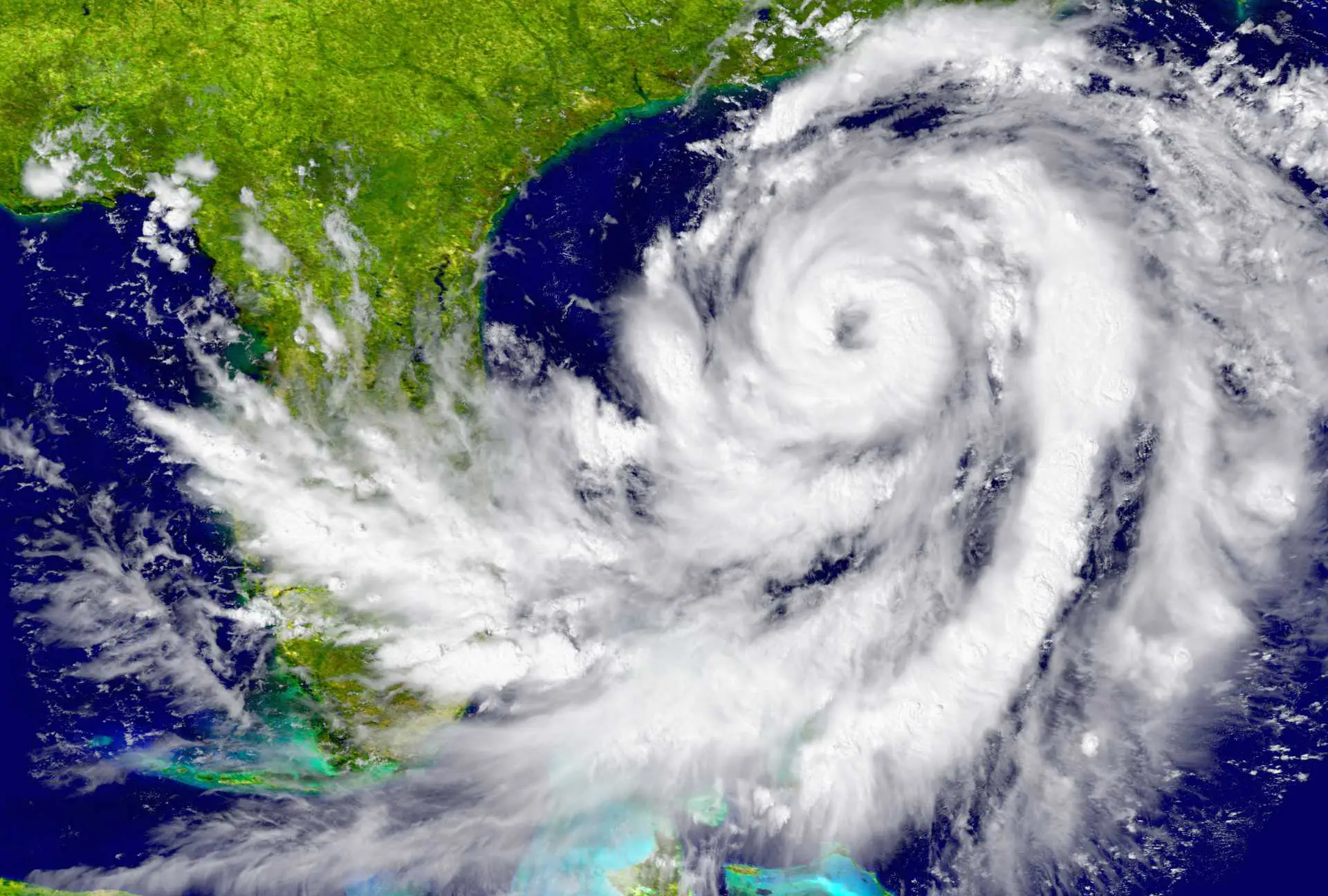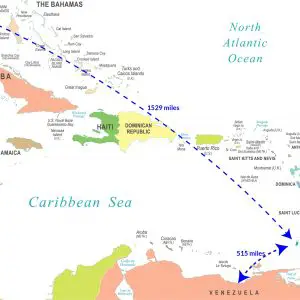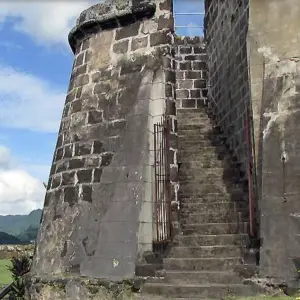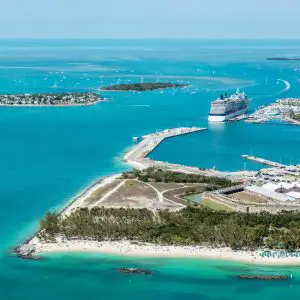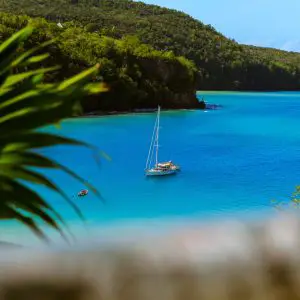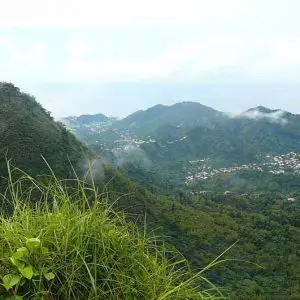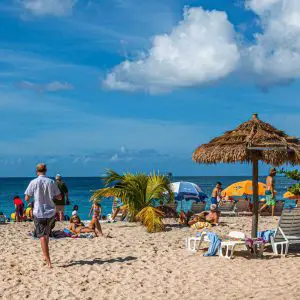Lately I’ve been doing research and planning my dream getaway to Grenada. Wonderful thoughts of a gently swaying hammock along Grand Anse Beach with a Mojito in my hand eventually turn to unsettling thoughts of a hurricane. “Do hurricanes hit Grenada?” I ask myself. It’s the same question I ask about every new Caribbean destination I plan to visit. Whether it’s morbid curiosity, fascination with mother nature or just the safety for myself and my family that has me pondering this question, I had to know. I delved headfirst into hurricane research and Grenada – this is what I learned.
Do hurricanes hit Grenada? Yes, hurricanes can and have hit the island of Grenada. Hurricane Ivan, a category 5, devastated the island on September 2004 and Hurricane Emily further pummeled the island a year later in July of 2005. Because the island is located in the southernmost part of the Atlantic Hurricane basin, the chances for a hurricane to hit are less than the Caribbean islands further north and west.
Now that you know hurricanes can and have hit Grenada you may be wondering how often they hit and how can you avoid hurricanes if you decide to visit. I also had the same questions so kept researching to get the answers.
First some explanation and definitions around hurricanes and the infamous “hurricane belt” are in order. Bear with me a minute. I promise it’ll be fascinating and worth it!
What is a hurricane?
A hurricane and major hurricane are categories of a tropical cyclone. The NHC (National Hurricane Center) defines a tropical cyclone as “a rotating, organized system of clouds and thunderstorms that originates over tropical or subtropical waters and has a closed low-level circulation”.
The remaining tropical cyclone categories are tropical depression and tropical storm, The storm is classified based on the sustained wind speed as follows:
| Tropical Cyclone Category | Max Sustained Winds |
| Tropical Depression | 38 mph or less |
| Tropical Storm | 39 – 73 mph |
| Hurricane | 74 – 110 mph |
| Major Hurricane | 111 mph or more |
We commonly hear the weatherman refer to a category number when describing a hurricane or major hurricane – “It’s a category 4 hurricane!”. The numbers are derived from the Saffir-Simpson Hurricane Wind Scale which rates the hurricane from 1-5 depending on its sustained wind speed and its estimated potential for property damage.
The information in the table below was derived from the NHC describing each category.
| Category | Sustained Winds | Types of Damage Due to Hurricane Winds |
| 1 | 74 – 95 mph | Very dangerous winds will produce some damage: Well-constructed frame homes could have damage to roof, shingles, vinyl siding and gutters. Large branches of trees will snap and shallowly rooted trees may be toppled. Extensive damage to power lines and poles likely will result in power outages that could last a few to several days. |
| 2 | 96 – 110 mph | Extremely dangerous winds will cause extensive damage: Well-constructed frame homes could sustain major roof and siding damage. Many shallowly rooted trees will be snapped or uprooted and block numerous roads. Near-total power loss is expected with outages that could last from several days to weeks. |
| 3 | 111 – 129 mph | Devastating damage will occur: Well-built framed homes may incur major damage or removal of roof decking and gable ends. Many trees will be snapped or uprooted, blocking numerous roads. Electricity and water will be unavailable for several days to weeks after the storm passes. |
| 4 | 130 – 156 mph | Catastrophic damage will occur: Well-built framed homes can sustain severe damage with loss of most of the roof structure and/or some exterior walls. Most trees will be snapped or uprooted and power poles downed. Fallen trees and power poles will isolate residential areas. Power outages will last weeks to possibly months. Most of the area will be uninhabitable for weeks or months. |
| 5 | 157 mph or more | Catastrophic damage will occur: A high percentage of framed homes will be destroyed, with total roof failure and wall collapse. Fallen trees and power poles will isolate residential areas. Power outages will last for weeks to possibly months. Most of the area will be uninhabitable for weeks or months. |
From this point forward this article will focus on hurricanes and major hurricanes.

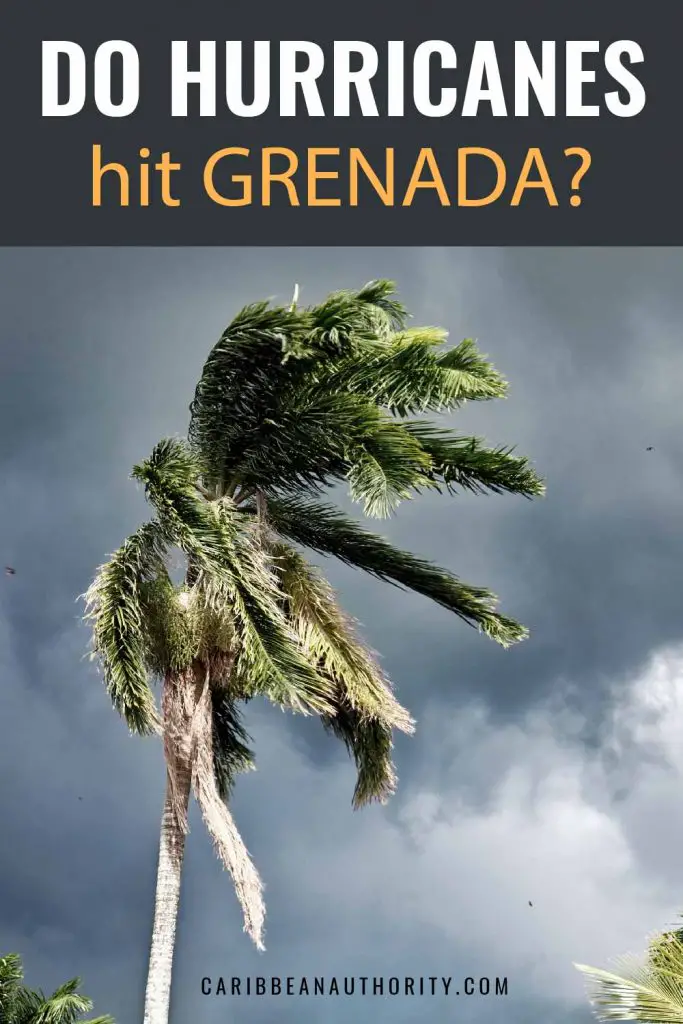
“Grenada is not in the Hurricane Belt, so it’s safe from hurricanes” WRONG!
I think we’ve all heard the term hurricane belt and can loosely define it as an area in the Caribbean where hurricanes hit. The truth is, no country or island in the Caribbean 100% safe from hurricanes.
While doing my research I was unable to find a scientific resource that utilizes the phrase hurricane belt. The origin of the term is unclear and makes me wonder if someone coined the phrase one day and from that point on it became an official term.
The NHC refers to “typical hurricane tracks”, instead of a hurricane belt, so I will too.
For each month of the hurricane season (June – November) the THC created maps illustrating the origin of and general track for hurricanes in the Atlantic Basin, which includes the Caribbean. The maps also include an indication as to whether a particular area is likely, more likely or most likely to be hit by a hurricane in the given month.
For copyright reasons, I’m unable to include the maps in this article but I strongly urge you to check out the typical hurricane track maps later. Just click the following link and scroll down to the section called Climatological Areas of Origin and Typical Hurricane Tracks by Month. https://www.nhc.noaa.gov/climo/#cpac
The table below summarizes the likelihood of a hurricane hitting Grenada during the hurricane season, based on the NHC’s Typical Hurricane Track maps.
Likelihood of a Hurricane Hit to Grenada
| Month | Likelihood |
| June | Not Likely |
| July | Not Likely |
| August | Likely |
| September | Likely |
| October | Not Likely |
| November | Not Likely |
To put this in perspective, let’s compare Grenada with a couple of other Caribbean islands.
Likelihood of a Hurricane Hit to a Sampling of Caribbean Islands
| Month | Grenada | Jamaica | The Bahamas |
| June | Not Likely | Not Likely | Not Likely |
| July | Not Likely | Not Likely | Likely |
| August | Likely | Very Likely | Very Likely |
| September | Likely | Most Likely | Most Likely |
| October | Not Likely | Very Likely | Very Likely |
| November | Not Likely | Not Likely | Not Likely |
It’s apparent that two of the most popular Caribbean vacation spots, Jamaica and the Bahamas, are more likely to be hit by a hurricane than Grenada.
History of Hurricanes Hitting Grenada
In the past 100 years, four hurricanes have hit Grenada.
- Hurricane Janet in 1955
- Hurricane Flora in 1963
- Hurricane Ivan in 2004
- and Hurricane Emily in 2005
Hurricane Janet
On September 22, 1955, Hurricane Janet hit Grenada and the island of Carriacou with 115 mph winds resulting in heavy damage to homes and a loss of 122 lives.
Hurricane Flora
On September 30, 1963, Hurricane Flora hit Grenada with 125 mph winds. The island sustained minor damage but six people drowned as a result of Flora.
Hurricane Ivan
On September 8, 2004, Hurricane Ivan hit Grenada with 130 mph winds devastating the island and killing 39 people. It was the southernmost hurricane on record to reach major hurricane strength destroying more than 14,000 homes on the island and over 80% of Grenada’s 100-year old nutmeg trees.
After Hurricane Ivan Grenada’s production of nutmeg (its biggest export at the time) was reduced by over 75%. More than 15 years later, the island has not yet reached its pre-Ivan production of nutmeg but continues to grow year over year.
Hurricane Emily
On July 14, 2005, Hurricane Emily hits Grenada with 90mph winds causing damage in areas already hit hard by Ivan just one year prior.
How Grenada Compares with other Caribbean Islands
If we compare the data from Hurricanecity.com with other Caribbean islands it becomes apparent that Grenada gets hit far less often than most islands in the Caribbean.
Note: For the larger islands I selected just an area instead of the entire island so the comparison is more equitable (i.e. one could argue the larger islands have been hit more because they have more surface area).
Hurricane Hits in the past 100 years
| Caribbean Island | Hurricane Hits |
| Aruba/Curacao/Bonaire | 2 |
| Grenada | 4 |
| Barbados | 4 |
| Negril, Jamaica | 7 |
| Santo Domingo, Dominican Republic | 8 |
| Puerto Rico | 9 |
| St. Thomas USVI | 11 |
| Cayman Islands | 16 |
| Turks & Caicos | 16 |
| St. Martin | 16 |
| Grand Bahama, Bahamas | 22 |
When is hurricane season in Grenada
Grenada’s hurricane season is from June 1st through November 30th. Interestingly:
- August and September are the only months a hurricane is likely to hit based on the NHC’s typical hurricane tracking model.
- July and September are the only months a hurricane did hit Grenada.
How to avoid a hurricane when visiting Grenada
To avoid a hurricane when visiting Grenada go between December 1 – May 31 which is outside the hurricane season. As far back as 1877, Grenada has never been hit outside the hurricane season.
Another way to avoid a hurricane while visiting Grenada is to go within the hurricane season but during a month that the NHC’s typical tracking maps indicate a hurricane is not likely – June, July, October, or November. Keep in mind the island did get hit during July by Hurricane Emily so maybe avoid July 🙂
If you chose to travel to Grenada during the hurricane season, bookmark the StormCarib website’s page for Grenada and check it regularly leading up to your trip. StormCarib provides regular reports. sometimes daily, on weather systems in the that may impact Grenada.
Regardless of when you choose to visit Grenada, I encourage you to enroll in the US Department of State’s Smart Traveler Enrollment Program (STEP). It’s free, fast and easy. You basically register your trip with the U.S. Embassy in Grenada so they’re aware when you’re traveling there so they can contact you if there’s a weather emergency.
Which Caribbean island is the safest from a hurricane
With only two hurricane hits in the past 100 years, the ABC Islands comprised of Aruba, Curacao & Bonaire are the safest islands from a hurricane.
Most of us have a fear of hurricanes and with good reason. They have the power to kill people, damage structures and land, and destroy a country’s economy. When visiting a Caribbean destination we can take steps to avoid getting caught in a hurricane by learning when and where they occur. I hope this article provided the information you need to visit Grenada without fear of getting caught in a hurricane.
Note: The National Hurricane Center website was a key source for this article. It’s chocked full of fascinating maps, educational resources, and data. I encourage you to check it out.
